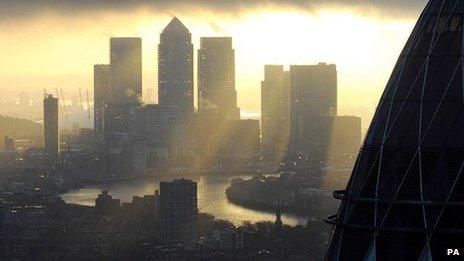Labour would bring back 50p tax rate
- Published
- comments
Ed Balls: "For the next Parliament, we will restore the 50p top rate of tax for those earning over £150,000."
Labour would reintroduce the 50p top rate of income tax for those earning over £150,000, if it returns to power, the shadow chancellor has said.
Ed Balls said a government analysis which showed it did not raise much was skewed by ministers' assumptions.
The previous Labour government created a new 50% tax band in 2010 for anyone with income of more than £150,000, but the coalition cut it to 45% last April.
Conservatives said an increase would put "the economic recovery at risk".
And some business leaders echoed that warning.
Speaking to the Fabian Society in central London, Mr Balls said: "When the deficit is still high, it cannot be right for David Cameron and George Osborne to have chosen to give the richest people in the country a huge tax cut."
He said Labour wanted to finish the job of getting the deficit down by "reversing this unfair tax cut for the richest 1% of people in the country".
Other Labour pledges Mr Balls highlighted in his speech included:
Expanding free childcare for working parents to 25 hours a week to help make work pay
Requiring the long-term unemployed to take a compulsory job or lose their benefits
Legislating for more competition and tougher regulation in energy and banking to make sure these markets serve the public interest
Setting up a British investment bank to support small businesses, whose business rates will be cut and then frozen
Mr Balls also announced a Labour government would balance the books and deliver a budget surplus as well as passing a law to ensure it adheres to "tough" and binding fiscal rules, he said.

A return to the 50p tax rate would see changes for high-earning City workers
This would mean eliminating the deficit and cutting debt as a share of GDP between 2015 and 2020.
Labour's commitment does not include borrowing extra money for long-term investments, such as the HS2 high-speed rail link.
Revenue row
The government said its decision to cut the top income tax rate to 45p had reduced Treasury income by £100m a year - a figure based on a 2012 assessment, external by HM Revenue and Customs (HMRC).
But Mr Balls said the latest HMRC figures showed the 50p rate had raised "almost £10bn more in tax" in the three years it was in place than was suggested by the 2012 assessment.
Conservative Treasury minister David Gauke said he stood by the 2012 assessment and insisted the 50p rate would "raise little, if anything".
Conservative Treasury minister David Gauke: "The wealthiest are paying a greater share of income tax"
He added: "If Labour want to deliver a reduced deficit, given their opposition to any of the spending cuts we're putting in place, then I'm afraid they're just going to have to put up taxes on everyone - not just the top earners."
Liberal Democrat Chief Secretary to the Treasury Danny Alexander accused Labour of "breathtaking" hypocrisy.
He said bringing back the 50p tax rate would not fix a "system full of loopholes" which Labour left behind in 2010.
Lord Myners - a former Labour City minister under Gordon Brown - said it was "not clear" how the tax would help the UK "compete with the world's growth economies".
"We need to encourage productive enterprise and effort rather than resort to predatory taxation," he said.
Government 'complacency'
The Unite union called Mr Balls' 50p tax plan a sign that Labour "understands the need for a fairer taxation system".
A spokesman said: "This is a beginning. Voters will know now Labour is emerging as a positive choice for this country.
"Contrast this move with the complacency of the government, which instead of finding ways to get money into people's pockets, insists to cash-strapped workers everything is rosy."
But Katja Hall, chief policy director of the CBI, warned that a 50p tax rate would put talented people off coming to the UK to invest and create jobs.
Simon Walker, director general of the Institute of Directors, said Labour needed to drop its practice of "knee-jerk reversion to the old socialist nostrums that so damaged Britain's economy in the past".
"It was, and remains, an envy-driven political gesture designed solely to drive a wedge between voters," he added.
Sir Stuart Rose, chairman of Ocado, said: "This will put at risk all the good work that has been done to put the economy back on track."
- Published25 January 2014
- Published25 January 2014
- Published25 January 2014
- Published25 January 2014
- Published8 December 2013
- Published7 September 2011
- Published14 February 2013